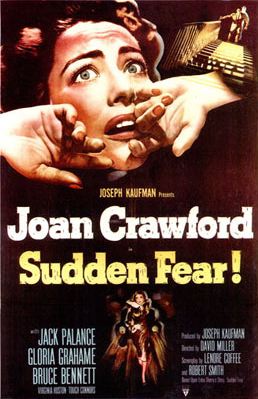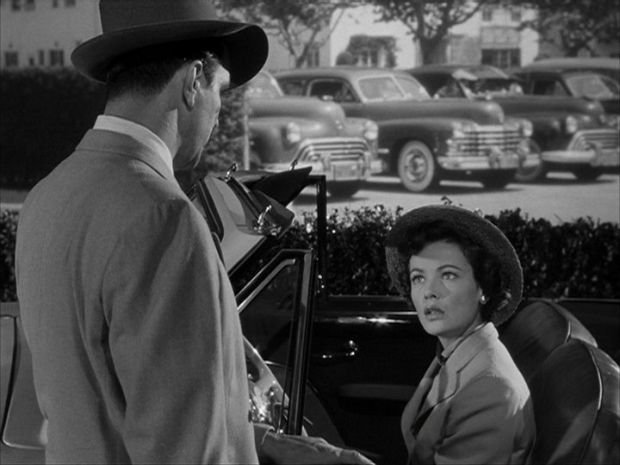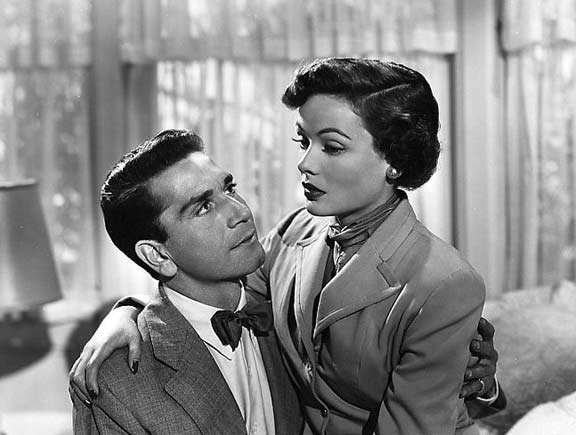
Below is another list of films that are sometimes identified as films noirs but that, in my opinion, really aren't:
Whirlpool
The Big Clock
House On Telegraph Hill
The Blue Gardenia
Shock
Sudden Fear
Shadow Man
The Stranger
These are all in fact what have come to be known as Hitchcockian
suspense thrillers, because Hitchcock remains the undisputed master of
the form. In these films, ideally at least, the viewer is seduced
into a strong identification with the protagonist, a damsel in
distress or a man wrongfully accused of a crime, and shares the
psychological suspense of his or her ordeal, which includes feelings of
guilt that may not be rational and are in any case disproportionate to
the jeopardy involved.
I think they're distinguishable from the true film noir because
they concentrate on the often aberrant psychology of an
individual and don't reflect a sense of society as a whole, or
existence itself, as deranged. They chart passages through a
moral/psychological disorientation that is more or less resolved by the
end of the film. The jeopardized innocents of this
tradition are often women, which also distinguishes it from the
tradition of the
classic film noir, which tends to center on male anxieties. These films involve an exploration of moral guilt, while classic films noirs involve an exploration of existential bewilderment and incompetence, almost always from a male point of view.
All of the films listed above fall far short of Hitchcock's best work
in the form, primarily because they fail to make us full psychological
participants in the jeopardy of their protagonists. Their
narratives may be purely Hitchcockian, beat for beat, but their
technique doesn't compel us into a deep and often unconscious identification with
their central characters.

In Whirlpool, for example, we
first see the Gene Tierney character in a department store where she's
just done some shoplifting — but we don't find this out until a store
detective follows her to her car and seizes the lifted item.
We're looking at the character from the outside, from the point of view of the
authorities. In a Hitchcock film, we'd see the theft when it
happened, share Tierney's fear as she tries to exit the store without
getting caught — even find ourselves rooting for her to get away with
it. With that identification established, we'd feel her guilt when she's caught, and feel it as our own guilt, because we secretly hoped she'd pull the theft off.

Ben Hecht, who wrote the script for Hitchcock's Notorious, also wrote Whirlpool
for Otto Preminger. The latter has all the ingredients of a
classic Hitchcockian thriller — so it's highly instructive to study
why it isn't one. It all comes down to Hitchcock's genius in
constructing identification with the protagonist, an identification
that can contradict our conscious disapproval of the protagonist's
behavior. Preminger made one of the best of all noirs, Angel Face, but on the evidence of Whirlpool he had no gift for, and apparently no great interest in, the Hitchcockian suspense thriller.
[The noir credentials of the films listed above are as follows — Sudden Fear is included in Kino's film noir box set The Dark Side Of Hollywood . . . Whirlpool, The House On Telegraph Hill and Shock are part of Fox's film noir series . . . Shadow Man is included in VCI's Forgotten Noir series . . . The Stranger is part of MGM's DVD noir series . . .The Big Clock is part of Universal's noir series . . . and the packaging of the Image DVD release of The Blue Gardenia identifies it as “classic noir with a feminine twist.” I don't see any point in calling any of these films noirs unless you're willing to call almost all of Hitchcock's American films noirs — which I think stretches the definition of noir beyond the point of usefulness.]
